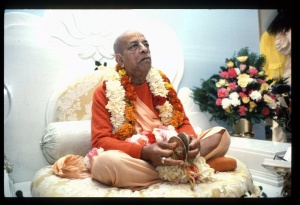SB 5.8.19: Difference between revisions
m (1 revision(s)) |
(Vanibot #0054 edit - transform synonyms into clickable links, which search similar occurrences) |
||
| (One intermediate revision by one other user not shown) | |||
| Line 1: | Line 1: | ||
{{info | {{info | ||
|speaker=King Bharata | |speaker=King Bharata | ||
|listener=King Bharata thinking to himself | |listener=King Bharata thinking to himself | ||
}} | }} | ||
[[Category:Srimad-Bhagavatam - Canto 05 Chapter 08]] | |||
[[Category:Bhagavatam Verses Spoken by Bharata Maharaja - Vanisource|050819]] | |||
<div style="float:left">'''[[Srimad-Bhagavatam]] - [[SB 5|Fifth Canto]] - [[SB 5.8: A Description of the Character of Bharata Maharaja|Chapter 8: A Description of the Character of Bharata Mahārāja]]'''</div> | |||
<div style="float:right">[[File:Go-previous.png|link=SB 5.8.18]] '''[[SB 5.8.18]] - [[SB 5.8.20]]''' [[File:Go-next.png|link=SB 5.8.20]]</div> | |||
{{RandomImage}} | |||
==== TEXT 19 ==== | ==== TEXT 19 ==== | ||
<div class="verse"> | |||
<div | :nimlocati ha bhagavān | ||
nimlocati ha bhagavān sakala-jagat-kṣemodayas trayy-ātmādyāpi mama na mṛga-vadhū-nyāsa āgacchati | :sakala-jagat-kṣemodayas | ||
:trayy-ātmādyāpi mama | |||
:na mṛga-vadhū-nyāsa āgacchati | |||
</div> | </div> | ||
| Line 14: | Line 22: | ||
==== SYNONYMS ==== | ==== SYNONYMS ==== | ||
<div class="synonyms"> | |||
<div | ''[//vanipedia.org/wiki/Special:VaniSearch?s=nimlocati&tab=syno_o&ds=1 nimlocati]'' — sets; ''[//vanipedia.org/wiki/Special:VaniSearch?s=ha&tab=syno_o&ds=1 ha]'' — alas; ''[//vanipedia.org/wiki/Special:VaniSearch?s=bhagavān&tab=syno_o&ds=1 bhagavān]'' — the Supreme Personality of Godhead, represented as the sun; ''[//vanipedia.org/wiki/Special:VaniSearch?s=sakala&tab=syno_o&ds=1 sakala]-[//vanipedia.org/wiki/Special:VaniSearch?s=jagat&tab=syno_o&ds=1 jagat]'' — of all the universe; ''[//vanipedia.org/wiki/Special:VaniSearch?s=kṣema&tab=syno_o&ds=1 kṣema]-[//vanipedia.org/wiki/Special:VaniSearch?s=udayaḥ&tab=syno_o&ds=1 udayaḥ]'' — who increases the auspiciousness; ''[//vanipedia.org/wiki/Special:VaniSearch?s=trayī&tab=syno_o&ds=1 trayī]-[//vanipedia.org/wiki/Special:VaniSearch?s=ātmā&tab=syno_o&ds=1 ātmā]'' — who consists of the three Vedas; ''[//vanipedia.org/wiki/Special:VaniSearch?s=adya&tab=syno_o&ds=1 adya] [//vanipedia.org/wiki/Special:VaniSearch?s=api&tab=syno_o&ds=1 api]'' — until now; ''[//vanipedia.org/wiki/Special:VaniSearch?s=mama&tab=syno_o&ds=1 mama]'' — my; ''[//vanipedia.org/wiki/Special:VaniSearch?s=na&tab=syno_o&ds=1 na]'' — not; ''[//vanipedia.org/wiki/Special:VaniSearch?s=mṛga&tab=syno_o&ds=1 mṛga]-[//vanipedia.org/wiki/Special:VaniSearch?s=vadhū&tab=syno_o&ds=1 vadhū]-[//vanipedia.org/wiki/Special:VaniSearch?s=nyāsaḥ&tab=syno_o&ds=1 nyāsaḥ]'' — this baby deer entrusted to me by its mother; ''[//vanipedia.org/wiki/Special:VaniSearch?s=āgacchati&tab=syno_o&ds=1 āgacchati]'' — has come back. | ||
</div> | </div> | ||
| Line 22: | Line 29: | ||
==== TRANSLATION ==== | ==== TRANSLATION ==== | ||
<div class="translation"> | |||
<div | |||
Alas, when the sun rises, all auspicious things begin. Unfortunately, they have not begun for me. The sun-god is the Vedas personified, but I am bereft of all Vedic principles. That sun-god is now setting, yet the poor animal who trusted in me since its mother died has not returned. | Alas, when the sun rises, all auspicious things begin. Unfortunately, they have not begun for me. The sun-god is the Vedas personified, but I am bereft of all Vedic principles. That sun-god is now setting, yet the poor animal who trusted in me since its mother died has not returned. | ||
</div> | </div> | ||
| Line 30: | Line 36: | ||
==== PURPORT ==== | ==== PURPORT ==== | ||
<div class="purport"> | |||
In the ''Brahma-saṁhitā'' (BS 5.38), the sun is described as the eye of the Supreme Personality of Godhead. | |||
:''yac-cakṣur eṣa savitā sakala-grahāṇāṁ'' | |||
:''rājā samasta-sura-mūrtir aśeṣa-tejāḥ'' | |||
:''yasyājñayā bhramati sambhṛta-kāla-cakro'' | |||
:''govindam ādi-puruṣaṁ tam ahaṁ bhajāmi'' | |||
As the sun arises, one should chant the Vedic ''mantra'' beginning with the Gāyatrī. The sun is the symbolic representation of the eyes of the Supreme Lord. Mahārāja Bharata lamented that although the sun was going to set, due to the poor animal's absence, he could not find anything auspicious. Bharata Mahārāja considered himself most unfortunate, for due to the animal's absence, there was nothing auspicious for him in the presence of the sun. | |||
</div> | |||
<div style="float:right; clear:both;">[[File:Go-previous.png|link=SB 5.8.18]] '''[[SB 5.8.18]] - [[SB 5.8.20]]''' [[File:Go-next.png|link=SB 5.8.20]]</div> | |||
__NOTOC__ | |||
__NOEDITSECTION__ | |||
</div> | |||
__NOTOC__ | |||
Latest revision as of 22:21, 18 February 2024

A.C. Bhaktivedanta Swami Prabhupada
TEXT 19
- nimlocati ha bhagavān
- sakala-jagat-kṣemodayas
- trayy-ātmādyāpi mama
- na mṛga-vadhū-nyāsa āgacchati
SYNONYMS
nimlocati — sets; ha — alas; bhagavān — the Supreme Personality of Godhead, represented as the sun; sakala-jagat — of all the universe; kṣema-udayaḥ — who increases the auspiciousness; trayī-ātmā — who consists of the three Vedas; adya api — until now; mama — my; na — not; mṛga-vadhū-nyāsaḥ — this baby deer entrusted to me by its mother; āgacchati — has come back.
TRANSLATION
Alas, when the sun rises, all auspicious things begin. Unfortunately, they have not begun for me. The sun-god is the Vedas personified, but I am bereft of all Vedic principles. That sun-god is now setting, yet the poor animal who trusted in me since its mother died has not returned.
PURPORT
In the Brahma-saṁhitā (BS 5.38), the sun is described as the eye of the Supreme Personality of Godhead.
- yac-cakṣur eṣa savitā sakala-grahāṇāṁ
- rājā samasta-sura-mūrtir aśeṣa-tejāḥ
- yasyājñayā bhramati sambhṛta-kāla-cakro
- govindam ādi-puruṣaṁ tam ahaṁ bhajāmi
As the sun arises, one should chant the Vedic mantra beginning with the Gāyatrī. The sun is the symbolic representation of the eyes of the Supreme Lord. Mahārāja Bharata lamented that although the sun was going to set, due to the poor animal's absence, he could not find anything auspicious. Bharata Mahārāja considered himself most unfortunate, for due to the animal's absence, there was nothing auspicious for him in the presence of the sun.